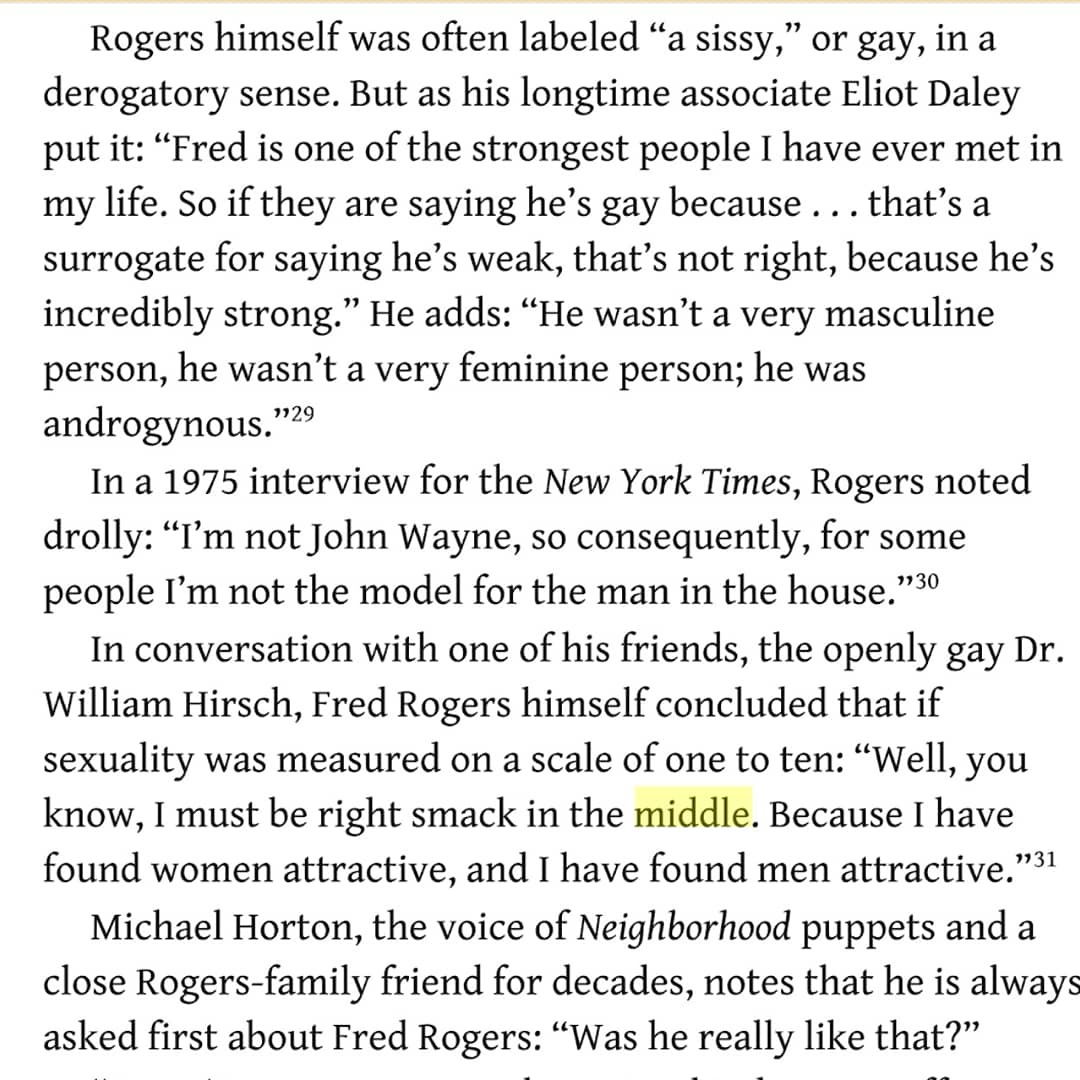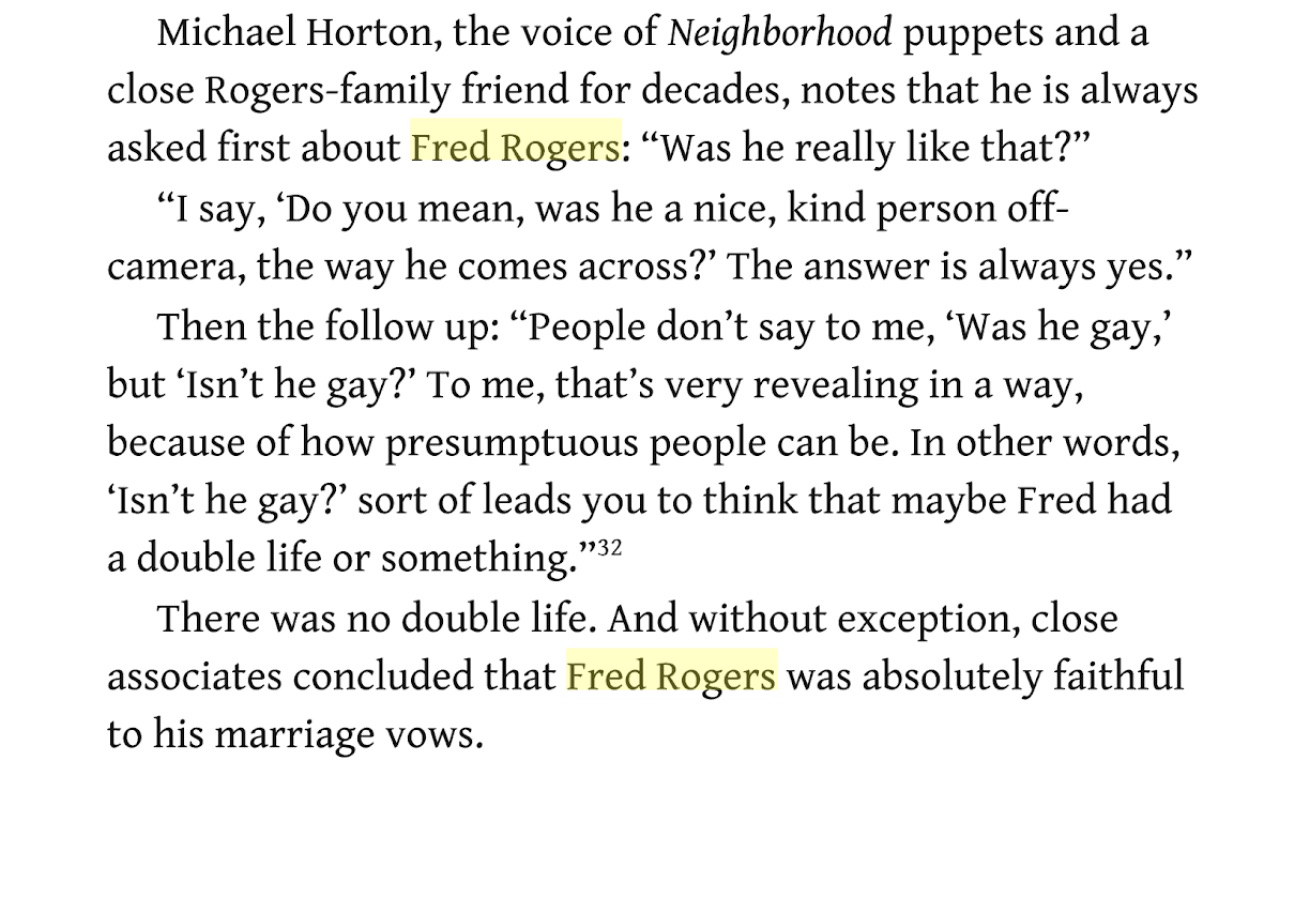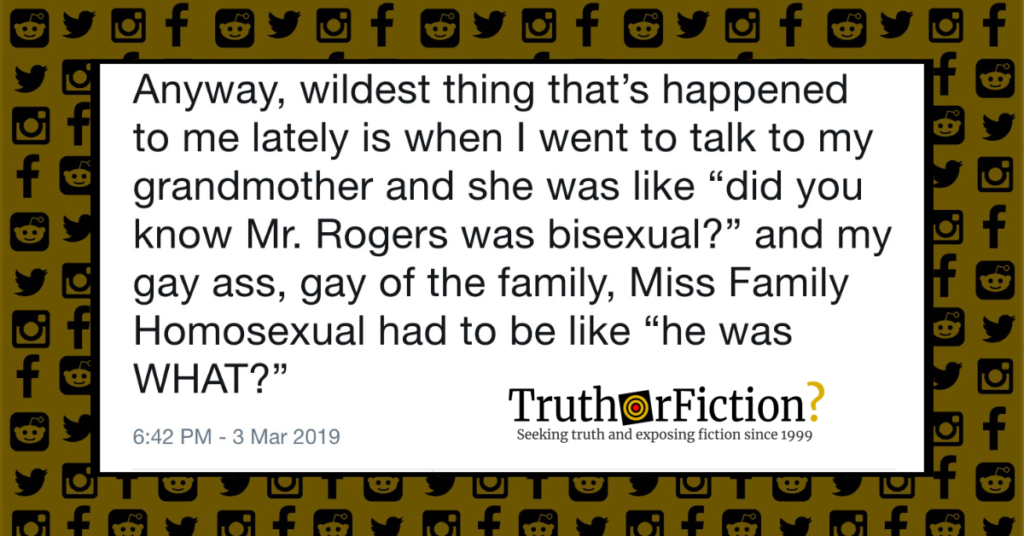On March 5 2019, an unexpected rumor that Fred Rogers (the creator and star of the beloved American children’s television show Mister Rogers’ Neighborhood) was bisexual began spreading on LGBTQ news sites and social media in general.
Several concurrently circulating tweets formed a basis for the rumor about Rogers’ sexuality. An especially popular stated:
Anyway, wildest thing that’s happened to me lately is when I went to talk to my grandmother and she was like “did you know Mr. Rogers was bisexual?” and my gay ass, gay of the family, Miss Family Homosexual had to be like “he was WHAT?”
In response, a second user provided a widely-shared screenshot from a book about Fred Rogers:
For everyone looking for a citation, it’s in “The Good Neighbor” by King. Screenshot from Google books.

The passage in the screenshot read:
Rogers himself was often labeled “a sissy,” or gay, in a derogatory sense. But as his longtime associate Eliot Daley put it: “Fred is one of the strongest people I have ever met in my life. So if they are saying he’s gay because … that’s a surrogate for saying he’s weak, that’s not right, because he’s incredibly strong.” He adds: “He wasn’t a very masculine person, he wasn’t a very feminine person; he was androgynous.”
In a 1975 interview for the New York Times, Rogers noted drolly: “I’m not John Wayne, so consequently, for some people I’m not the model for the man in the house.”
In conversation with one of his friends, the openly gay Dr. William Hirsch, Fred Rogers himself concluded that if sexuality was measured o na scale of one to ten: “Well, you know, I must be right smack in the middle. Because I have found women attractive, and I have found men attractive.”
Michael Horton, the voice of Neighborhood puppets and a close Rogers-family friend for decades, notes that he is always asked first about Fred Rogers: “Was he really like that?”
Thanks to the cutoff point, it was not precisely clear if Horton’s question was about Rogers’ general kind demeanor (likely) or his presumed sexuality (less likely.) As the Twitter user indicated, the screenshot was available via Google Books under the title The Good Neighbor: The Life and Work of Fred Rogers.
The book was published in 2018, 15 years after Rogers’ 2003 death. We viewed the second portion of the passage not visible in the circulating screenshot:

It read:
Michael Horton, the voice of Neighborhood puppets and a close Rogers-family friend for decades, notes that he is always asked first about Fred Rogers: “Was he really like that?”
“I say, ‘Do you mean, was he a nice, kind person off-camera, the way he comes across?’ The answer is always yes.”
Then the follow up: “People don’t say to me, ‘Was he gay,’ but ‘Isn’t he gay?’ To me, that’s very revealing in a way, because of how presumptuous people can be. In other words, ‘Isn’t he gay?’ sort of leads you to think that maybe Fred had a double life or something.”
There was no double life. And without exception, close associates concluded that Fred Rogers was absolutely faithful to his marriage vows.
The Good Neighbor: The Life and Work of Fred Rogers was searchable in Google Books format, and Hirsch’s name appeared three times. The only time it was in relation to sexual orientation was the quoted passage. The cited 1975 New York Times article was live, and the passage referenced in the book did not overtly address sexuality:
Mr. Rogers said his basic premise is that “if we can somehow feel accepted and loved as we are — and I do think that’s what Jesus came to live out — then we can begin to care for somebody else.”
Some critics say his mild‐mannered approach and his stress on caring makes him too soft to be an effective male image. “I’m not John Wayne,” he said drolly, “so consequently for some people I’m not the model for the man in the house.
“Big bruisers sit down and watch with their kids, then write to say, ‘I didn’t think much of you until I had kids and saw what was going on, but I’ll tell you I now watch and enjoy it.”
The brief passage in The Good Neighbor focused on long-circulating rumors about Rogers’ sexuality, rumors hinted at in the 1975 New York Times piece in which Rogers acknowledged his “mild-mannered” image. In the book’s context, it seemed possible to view that line of questioning as potentially related to general machismo.
The Good Neighbor also claimed that Rogers’ openly gay friend once said Rogers described himself as “in the middle” of the sexuality spectrum, purportedly having been attracted to both men and women during his life. That passage was followed up with a third person indicating that Rogers was monogamous and faithful.
The biography of Fred Rogers from which the claim he was bisexual was sourced was published in September 2018, and the information appeared to come to Twitter by way of a user recollecting a conversation with her relative about the relative’s reading of the book. Another user found and cited the claim with the relevant page. No fanfare about this purported tidbit occurred at the time of its release, when it was reviewed, or at any time during its stay on bestsellers’ lists. It was simply a conversation between two people brought later to Twitter that codified Rogers as bisexual.
The Good Neighbor cautiously placed a suggestion Rogers may have been bisexual into the words of a friend of the actor, a conversation which may or may not have taken place in the manner described or at all in that third-hand context. Even if the conversation occurred as described, it didn’t indicate Fred Rogers claimed to be bisexual — merely that he may at one point have expressed a viewpoint in line with a bisexual orientation. The claim was unverified, and unlikely to become more verified so many years after Rogers’ death.

